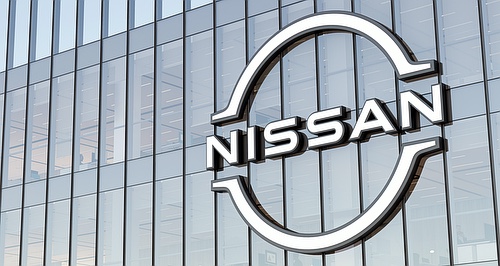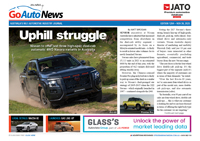Make / Model Search
News - NissanTop heavy moves for Nissan AustraliaNissan leaves lower priced models to Chinese entrants as Aussie buyers chase higher spec6 Feb 2025 By MATT BROGAN NISSAN Australia says its customers are moving toward higher-grade models in larger numbers than ever before, with some of its more popular SUV lines now almost exclusively top heavy.
Speaking with GoAuto at the launch of the MY25 Nissan Qashqai in Melbourne this week, Nissan Oceania vice president and managing director Andrew Humberstone said the buying habits of Australian buyers are helping to define the brand’s shift toward becoming a more premium brand, leaving budget-conscious buyers to shop new-to-market entrants, primarily those from China.
“Australia is very different to the United States or the UK, for example. In the UK, car ownership comes as part of a monthly payment, and the price (of the vehicle) is almost irrelevant,” the British ex-pat explained.
“In Australia, customers want to see the entry level price … which is why we (Nissan) need to be aggressive and competitive in pricing our entry level vehicles.
“It’s usually not until customers come into the showroom that they begin to decide what the car will cost each month, and how a finance deal, and perhaps the vehicle’s residual value, will impact their monthly payments.
“That’s when you see them walking up (the model range).
As an example, Mr Humberstone said Qashqai buyers favoured higher grades, with just eight per cent of Australian buyers previously opting for the entry ST variant (from $34,665 plus on-road costs).
By contrast, “27 or 28 per cent” of buyers opted for a mid-tier Qashqai ST-L (from $42,965 +ORC) with the remainder opting for a Ti grade (from $48,165 +ORC) or above.
Interestingly, Mr Humberstone said some 15 per cent of Australian Qashqai buyers opted to purchase an e-Power (petrol-electric) – a model whose sticker price begins from $52,365 +ORC.
Adding to Mr Humberstone’s remarks, Nissan Oceania aftersales director Michael Hill said the brand had transitioned from one that historically centered its approach on offering a $19,990 or $29,990 entry point to model ranges as a means of getting buyers onto the dealer forecourt.
“In my 14 years at Nissan, I’ve seen the brand transition from one where we were selling a lot more $29,990 base grade X-Trails, for example, to one that attracts buyers wanting a model higher in the walk-up,” he added.
“I think the financing element of what we do has allowed customers an easier walk-up, whereas back in the old days, it was very much a cash transaction, or the customer would figure out their own finance before they entered the showroom.
“But as financing has become more affordable … it has enabled customer to go higher.
Mr Humberstone agreed, saying the days of the ‘$29,990 Nissan customer’ (or entry-grade customer) are largely a thing of the past.
He said the arrival of cheaper Chinese entrants, predominantly at the lower end of the market, had largely moved budget buyers toward such brands, and away from those of Japanese origin.
Moreover, Nissan customers – both new and returning – now favour “more premium” grades, and in turn those with more premium price tags.
“I think customers that have been Nissan customers from the start (of their new-car journey) have probably evolved as their economic situations evolved, whereas some of those who shopped on the entry price alone have moved elsewhere,” he proffered, adding that Nissan customers shopped the brand not only on quality and value, but also for the level of support available irrespective of location.
“We have a broad product range, we have a vast dealer network, and we invest heavily in both.
Mr Humberstone said it was his view that many new entrants to the Australian market appeared not to invest in providing comparable dealership and aftersales support networks as legacy brands, suggesting those without such foresight may be short-lived.
“It is why, even as a greater number of new entrants come to market, that I don’t think we (established marques) will see any great dilution of our positions,” he continued.
“I think there will be a lot of movement in the market, even at the top, and certainly at the bottom, but there will come a time when some (brands) find it’s too expensive to remain in the market.
“They do not have the infrastructure, or the dealer network. Their economies of scale are not there; and they will exit again,” he predicted.
“Of course, there are some very strong Chinese brands that are here to stay, and I think they will do very well. But there’s a segment for that, and they will have to build their brand up over the years, as we all have.
“They will decide where they want to sit in terms of brand and lifestyle positioning and premiumness or newness – they will find their comfort zone.
 Read more4th of February 2025  Mitsubishi yet to decide on Nissan-Honda dealDecision on whether Mitsubishi joins planned Honda-Nissan merger pushed out to mid-Feb1st of February 2025  Nissan moves to offer 10-year warrantyTen-year/300,000km warranty and roadside assist plus five-year flat price servicing15th of January 2025  Nissan R32 EV on show in TokyoTokyo Auto Salon stage welcomes one-off Nissan R32 Skyline GT-R EV ‘passion project’ |
Click to shareNissan articlesResearch Nissan Motor industry news |











Facebook Twitter Instagram